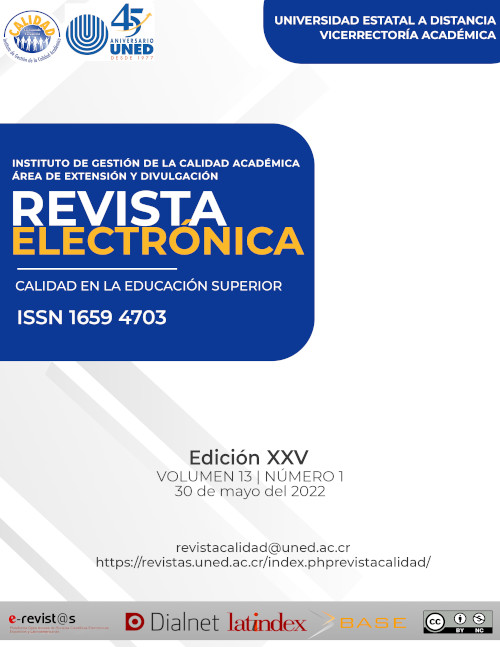Perception of university students about classroom presence and remote presence during the COVID-19 pandemic
DOI:
https://doi.org/10.22458/caes.v13i1.3206Keywords:
higher education, teaching, learning, face-to-face, evaluation, COVID-19Abstract
This study was intended to obtain the perception of undergraduate and graduate studies of careers in human movement sciences, about teaching, learning and evaluation during the COVID-19 pandemic related to the SARS-CoV-2 virus. A total of 23 students (12 degrees and 11 graduate students) aged between the ages of 19 and 45 participated voluntarily in this study. In order to obtain informed consent of participation, the student was contacted by different virtual means such as social networks. Once the sample was obtained to participate in the investigation, it was proceeded to send by email due consent and the semi-structured interview to be completed by the participants. This interview was designed by the principal investigator and analyzed at the discretion of pedagogy experts. Once the answers were obtained, they were systematized using clusters according to thematic similarity for analysis. The results showed that students perceive more meaningful learning when they are present in the classroom. In addition, they rescue that remote presence facilitates greater use of time and resource and rescue their relevance in courses with a high theoretical component. In addition, they consider that evaluations should focus on the assignment of investigative practices without memoristic testing. Based on the results, it is concluded that in view of the eventuality of the COVID-19 pandemic, the student considers that the methodology of remote presence can be a potential option for the development of theoretical component and use the hours of face-to-face contact for the development of practices that allow him to experience and implement his learning.
References
Aguilar-Salinas, W., Fuentes-Lara, M., Justo-López, A. y Rivera-Castellón, R. (2019). Percepción de los Estudiantes acerca de la Modalidad Semipresencial en la Enseñanza de las Ciencias Básicas de la Ingeniería. Un Estudio de Caso Universitario. Form. Univ. 12(3), 15-26. Recuperado de https://www.scielo.cl/pdf/formuniv/v12n3/0718-5006-formuniv-12-03-00015.pdf
Ayala, E. y Cabrera, R. (2010). ¿Qué hace a un docente, un buen docente? Trabajo presentado en el Cuarto Foro Nacional de Ciencias Básicas. México. Recuperado de http://dcb.fic.unam.mx/Eventos/Foro4/Memorias/Ponencia_12.pdf
Berry, G. (2018). LEARNING FROM THE LEARNERS. Student Perception of the Online Classroom. The Quarterly Review of Distance Education, 19(3), 39–56. Recuperado de http://web.a.ebscohost.com.una.remotexs.co/ehost/pdfviewer/pdfviewer?vid=4&sid=f7818813-7c71-4064-8d6f-a09f708d84bf%40sessionmgr4006
Cabero, J. (2014). La formación del profesorado en TIC: unas referencias conceptuales. En J. Silva y J. Salinas (Eds.), Innovando con TIC en la formación inicial docente: Aspectos teóricos y casos concretos (pp. 173-192). Chile. Recuperado de: http://www.ub.edu/obipd/wpcontent/uploads/2020/03/Materiales_curriculares_digitales_en_la.pdf
Carrillo, M., Hernández, G., y Nieto, E. (2018). Experimentos de aula como estrategia de enseñanza en el aprendizaje de la química. Tecné, Episteme y Didaxis: TED, (Extraordin). Recuperado a partir de https://revistas.pedagogica.edu.co/index.php/TED/article/view/8726
Corona, C. (2008). ¿Qué hace al buen maestro?: La visión del estudiante de ciencias físico matemáticas. Latin-American Journal of Physics Education, 2(2), 147-15. Recuperado de https://dialnet.unirioja.es/servlet/articulo?codigo=2735591
García-Perdomo, H. A. y Beas-Sandoval, L. R. (2020). La enseñanza en los programas académicos y quirúrgicos en tiempos de COVID-19. Revista Mexicana de Urología, 80(2), 1-3. Recuperado de https://revistamexicanadeurologia.org.mx/index.php/rmu/article/view/622/843
Hubackova, S. & Semradova, I. (2016). Evaluation of Blended Learning. Procedia - Social and Behavioral Sciences, 217, 551-557. https://doi.org/10.1016/j.sbspro.2016.02.044
Kumar, R. & Pande, N. (2017). Technology-mediated learning paradigm and the blended learning ecosystem: what works for working professionals? Procedia Computer Science, 122, 114-1123. https://doi.org/10.1016/j.procs.2017.11.481
Balibrea, J. M., Badia, J. M., Rubio, I., Martín, E., Álvarez, E., García, S., Álvarez, M., Martín, E., Martínez, S., Pascual, I., Pérez, L., Ramos, J. L., Espin, E., Sánchez, R., Soria, V., López, R. y Morales-Conde, S. (2020). Manejo quirúrgico de pacientes con infección por COVID-19. Recomendaciones de la Asociación Española de Cirujanos. Cirugía Española, 98(5), 251-259. Recuperado de https://www.elsevier.es/es-revista-cirugia-espanola-36-pdf-S0009739X20300695
Moore, M. G. & Kearsley, G. (2012). Distance education: A systems view of Online Learning. Belmont, CA. USA: WADSWORTH. CENGAGE Learning.
Rodríguez-Leor, O., Cid-Álvarez, B., Ojeda, S., Martín-Moreiras, J., Rumoroso, J. R., López-Palop, R., Serrador, A., Cequier, A., Romaguera, R., Cruz, I., Pérez de Prado, A. y Moreno, R. (2020). Impacto de la pandemia de COVID-19 sobre la actividad asistencial en cardiología intervencionista en España. REC Interv Cardiol., 2(2),82-89. Recuperado de https://dialnet.unirioja.es/servlet/articulo?codigo=7872131
Rigo, D. Y., Riccetti, A. E., Siracusa, M. y Paoloni, P. (2019). Tres experiencias sobre clases invertidas para promover el compromiso por el aprendizaje. Percepciones de estudiantes universitarios. Revista Páginas de Educación, 12(2), 43-58. Recuperado de http://www.scielo.edu.uy/pdf/pe/v12n2/1688-7468-pe-12-02-43.pdf
Sánchez, D. A. y Poveda, F. A. (2015). Percepción académica sobre la evaluación en el contexto universitario modalidad a Distancia Tradicional y virtual. Cultura, educación y Sociedad, 6(1), 63-78. Recuperado de https://revistascientificas.cuc.edu.co/culturaeducacionysociedad/article/view/756/pdf_92
Downloads
Published
How to Cite
Issue
Section
License
Esta revista provee acceso libre inmediato a su contenido bajo el principio de que hacer disponible gratuitamente la investigación al publico, lo cual fomenta un mayor intercambio de conocimiento global.
